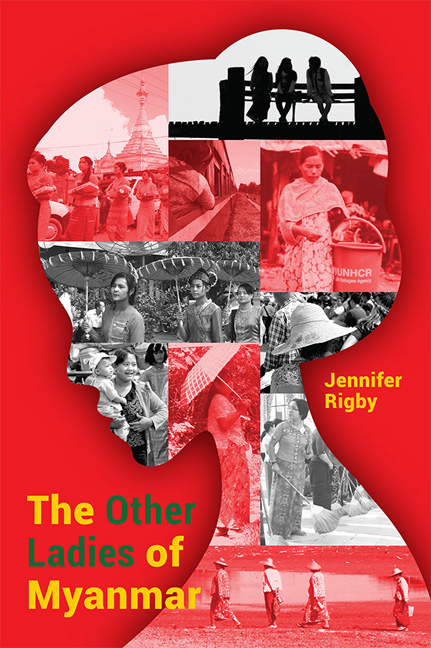Book contents
- Frontmatter
- Dedication
- Contents
- Preface
- Acknowledgements
- Introduction
- Timeline
- 1 The Activist: Cheery Zahau
- 2 The Feminist Buddhist Nun: Ketu Mala
- 3 The Survivor: Mi Mi
- 4 The Businesswoman: Yin Myo Su
- 5 The Environmental Campaigner and Princess: Devi Thant Cin
- 6 The Artist: Ma Ei
- 7 The Refugee Sexual Health Nurse: Mu Tha Paw
- 8 The Rohingya and Human Rights Champion: Wai Wai Nu
- 9 The Farmer: Mar Mar Swe
- 10 The Pop Star: Ah Moon
- 11 The Politician: Htin Htin Htay
- 12 The Archer: Aung Ngeain
- Conclusion
- About the Author
- Frontmatter
- Dedication
- Contents
- Preface
- Acknowledgements
- Introduction
- Timeline
- 1 The Activist: Cheery Zahau
- 2 The Feminist Buddhist Nun: Ketu Mala
- 3 The Survivor: Mi Mi
- 4 The Businesswoman: Yin Myo Su
- 5 The Environmental Campaigner and Princess: Devi Thant Cin
- 6 The Artist: Ma Ei
- 7 The Refugee Sexual Health Nurse: Mu Tha Paw
- 8 The Rohingya and Human Rights Champion: Wai Wai Nu
- 9 The Farmer: Mar Mar Swe
- 10 The Pop Star: Ah Moon
- 11 The Politician: Htin Htin Htay
- 12 The Archer: Aung Ngeain
- Conclusion
- About the Author
Summary
TWO PEOPLE are on the stage in a gloomy performance space in downtown Yangon. One of them, the woman, has an apple, and a knife. The other, a man, has an array of make-up on a table behind him.
She starts to cut the apple and then feeds it to him. He accepts, chews, swallows. Then says, in Burmese: “I don't like apples.”
He opens up one of the compacts, starts to put make-up on her.
“Make me beautiful,” she tells him. “I want to be beautiful.”
They go through the process again. He chews the apple. She purses her lips for the lipstick. Then they do it again. And again.
Soon, she is still feeding him apples, and by now, he is shouting about how he doesn't like apples. Meanwhile, her face is a grotesque mask of make-up: red slashes of lipstick, dark eye-shadow circles around her eyes like bruises, pancake-thick foundation. She is still asking to be made beautiful. He is still eating the apples.
The stage goes dark; the performers bow.
It's a startling, moving and powerful piece, and the audience love it. For me, it talks about human relationships, how often we don't really listen to the ones we love, and the complicated relationships between men and women in a world of outdated gender norms — men get fed, women get makeovers.
The artist behind it is Ma Ei, one of Myanmar's leading female performance artists in a vibrant modern scene.
“It is about relationships,” she says afterwards. “Not only men and women but also mother and daughter, mother and son, brother and sister, friends. Sometimes we are tired of each other, but we can't stop, really, can we?” she says. She pauses, then looks up, wide-eyed, smiling. “Right?” she adds.
Ma Ei is a fascinating artist. Her work — powerful, questioning, feminist — would be ahead of the curve in any country, but in Myanmar, it's jaw-dropping. In 2015, she made headlines with an exhibition about periods, in which she lay in a red-lit room for three days and handed out sanitary towels to visitors. This, in a country where most people don't even talk about menstruation.
- Type
- Chapter
- Information
- The Other Ladies of Myanmar , pp. 59 - 66Publisher: ISEAS–Yusof Ishak InstitutePrint publication year: 2018

